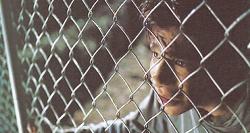It
was alleged that in 1993, during the Carlos Salinas Presidency,
30 of Mexico's richest businessmen were invited to what became
known as the
Billionaire’s Banquet,
where the assembled were encouraged to pledge $25 million/person
for the upcoming presidential campaign.
Judging
by Rodrigo Pla’s second feature film, La Zona
(2007), not much has changed as it concerns Mexican politics
and the great divide between the prosperous and penurious.
Gated communities are a common feature in all the big ciudades,
but not nearly as common as the multitudinous poor for whom
the better life is but a dream that will not survive the morning’s
first light.
La
Zona, found in the heart of Mexico City, is an opulent, walled-in
community, with its own high tech surveillance and security
systems. The film opens with the camera gliding from one immaculate
residence to another, then suddenly lifting to reveal the
squalor on the other side of a 30-feet high wall, where the
wretched of Mexico are concentrated, many of whom must resort
to crime to make dead-ends meet.
 During
a driving rainstorm, a huge billboard sign comes crashing
down on the wall, knocking out La Zona’s electricity.
Three criminally minded youths hoist themselves up the sign
and enter the forbidden zone – their El Dorado. But
things go horribly wrong during an attempted house robbery
and an elderly woman is murdered. A maid alerts private security
and two of the thieves are killed, but the third escapes.
Instead of notifying the local authorities, the citizens of
La Zona decide to take the law into their owns hands. They
form a vigilante group, the event which becomes the focal
point of Uruguayan-born Rodrigo Pla’s complex and expertly
cinematographed story refracted through the conflicted psyche
of 16-year old Alejandro (Daniel Tovar), who is caught between
family, privilege and the calling of conscience. When he learns
that the mob, which includes his father, has decided on frontier
justice for the missing bandito, Alejandro must make
the most important decision of his life.
During
a driving rainstorm, a huge billboard sign comes crashing
down on the wall, knocking out La Zona’s electricity.
Three criminally minded youths hoist themselves up the sign
and enter the forbidden zone – their El Dorado. But
things go horribly wrong during an attempted house robbery
and an elderly woman is murdered. A maid alerts private security
and two of the thieves are killed, but the third escapes.
Instead of notifying the local authorities, the citizens of
La Zona decide to take the law into their owns hands. They
form a vigilante group, the event which becomes the focal
point of Uruguayan-born Rodrigo Pla’s complex and expertly
cinematographed story refracted through the conflicted psyche
of 16-year old Alejandro (Daniel Tovar), who is caught between
family, privilege and the calling of conscience. When he learns
that the mob, which includes his father, has decided on frontier
justice for the missing bandito, Alejandro must make
the most important decision of his life.
The
film moves briskly, its deliberate pacing and suspenseful
build up owed to the creative camera work of Emiliano Villanueva,
who doesn’t stop at the facile contrasts offered by
La Zona and La Barrio, but focuses on them until they reveal
their souls. Sometimes rock steady, sometimes unstable, the
lens takes its cue from the film's varied locations as well
as from the edgy mindset of La Zona’s citizens as they
grapple with their identity.
Despite
the use of conventional props (haves versus have-nots, good
cop/bad cop), our identification with the La Zona's
major and especially minor characters is what sustains this
gritty film, whose thoughtful script explores the underpinnings
of power and control and the imperatives of mob rule. Pla’s
agenda is far-reaching and it is to his credit, in only his
second film (his first was Inner Desert), that he
implicitly raises the question of what are the real differences,
if any, between the rich and poor -- besides money. Does reason
or human nature prevail when the going gets rough? If the
project of La Zona could be reduced to an epigram,
it would provided by Spanish philosopher Ortega y Gasset,
who observed that "every life a reaction to the insecurities
of life."
For
the best of reasons, La Zona won the People’s
Choice Award at Montreal’s
2007 Festival du Nouveau Cinéma,
and prior to that, a major mention at the Venice Film Festival.
Since it’s all too sadly predictable that festival films,
including the very best, are mostly fated to disappear once
they’ve exhausted the festival circuit, La Zona
will probably not buck the trend, but if I were a betting
man . . . .